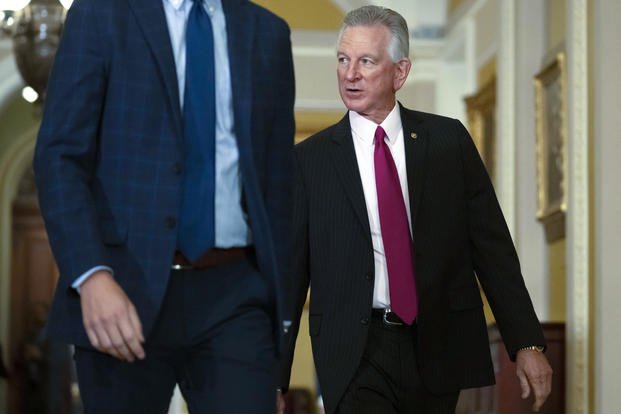
The Senate will vote on the nominees for the No. 2 general in the Marine Corps and the chiefs of the Air Force and Navy, Senate Majority Leader Charles Schumer, D-N.Y., announced Tuesday night. The sudden break in the months-long political standoff over military promotions comes after a medical crisis hospitalized the Marines’ top general, spotlighting the hundreds of unfilled jobs at the top of the military services.
The chamber will also consider in the coming weeks a plan proposed by Senate Armed Services Committee Chairman Jack Reed, D-R.I., that could lead to the confirmation of the remaining 370-plus military officers whose promotions have been in limbo for months, Schumer added Wednesday morning. But it’s unclear whether the proposed workaround to Alabama Republican Sen. Tommy Tuberville’s military confirmation blockade will succeed since at least nine Republican senators will need to support it.
“The situation at the Marine Corps is precisely the kind of avoidable emergency that Sen. Tuberville has provoked through his reckless holds,” Schumer said on the Senate floor Wednesday. “These holds cannot and must not continue.”
Read Next: An Air Force Academy Cadet Pleaded Guilty to Using Magic Mushrooms. Is DoD Ready for the Drug’s Legal Rise?
Since late February, Tuberville has blocked the quick confirmation of all but three senior military officers as part of a protest against the Pentagon’s policy of providing leave and travel expenses to troops seeking abortions.
The exact timing of the votes on the Marine, Air Force and Navy leaders has not yet been announced as senators negotiate trimming down the two days the chamber would typically have to wait between Schumer’s announcement and votes.
While Tuberville’s hold cannot prevent the Senate from voting on nominees, it means the chamber must take individual roll call votes on each nominee rather than confirming them in a group in a voice vote. Democrats have generally resisted holding those roll call votes, arguing that doing so could encourage other senators to use the same tactic as Tuberville in future political fights.
On Monday, the Marine Corps announced that its commandant, Gen. Eric Smith, had been hospitalized because of an undisclosed medical emergency. Coming at a time when there is no Senate-confirmed assistant commandant, a three-star general has been tabbed to temporarily fill in for Smith.
Lt. Gen. Christopher Mahoney was nominated to be assistant commandant of the Marines and to get a fourth star in July, but he has been one of the 378 nominees caught in Tuberville’s hold.
Smith’s health scare prompted Tuberville to announce Tuesday he would use a procedural maneuver to force a vote on Mahoney without technically dropping his hold. Separately, Sen. Dan Sullivan, R-Alaska, was also preparing to use the same procedural maneuver to force votes on Gen. David Allvin to be chief of staff of the Air Force and Adm. Lisa Franchetti to be the Navy’s chief of naval operations.
The same procedural dance led the Senate in September to confirm Smith, as well as the chief of staff of the Army and the chairman of the Joint Chiefs of Staff — the only three generals to be confirmed since Tuberville’s hold started.
“For months, Schumer publicly said that he would not allow votes on military nominations, but has now caved for the second time,” Tuberville’s office said in a news release Wednesday taking credit for Schumer setting up votes on Mahoney, Allvin and Franchetti.
While the Senate is poised to end the leadership vacuum at the very top of the services, the fates of the hundreds of remaining nominees are still up in the air. The holds also include vice chiefs of the Army, Navy and Air Force who wouldn’t be able to fill in if those services face a similar crisis as the Marines.
The proposal from Reed to confirm the rest of the nominees would essentially temporarily change Senate rules until the end of 2024 so that most of the nominees could be confirmed in a single vote rather than individually, regardless of Tuberville’s objection. Combatant commanders and members of the Joint Chiefs of Staff would still be subject to individual votes.
While Republicans so far have appeared cool to the plan over concerns about setting a precedent to dilute the power of individual senators, Democrats were hopeful that Smith’s medical emergency could move some Republicans to support the proposal.
“There is an increasing interest on the Republican side because there is a sense that we’ve reached the point where the politics is just intolerable here,” Sen. Richard Blumenthal, D-Conn., a member of the Senate Armed Services Committee, told reporters Tuesday. “Game-playing with our national security in the way that Sen. Tuberville is doing absolutely is unacceptable at this point.”
Sen. Tim Kaine, D-Va., also an Armed Services Committee member, put a marker down for when he thinks the standoff should end: “We got to find an answer to this by Veterans Day.”
— Rebecca Kheel can be reached at [email protected]. Follow her on X @reporterkheel.
Related: Marine Commandant Remains Hospitalized as Senator Moves to Lift Blockade on Service’s Second in Command
Story Continues
